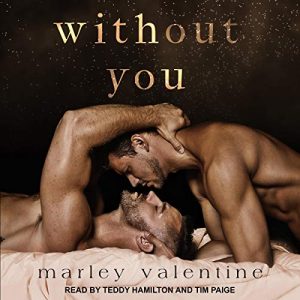Narrated by Teddy Hamilton and Tim Paige
Marley Valentine is a new-to-me author, and to be honest, this book wasn’t even on my radar until I saw it mentioned on an FB group (I can’t remember which one!) in which someone had asked for recommendations for romances that featured a widow falling for her late husband’s brother. It’s not a storyline I normally seek out, but I was intrigued enough to look up Without You on Amazon and thought I’d give it a try. About a week later, I saw the audio version on a Coming Soon list and decided that was the way to go. With two such terrific narrators as Teddy Hamilton and Tim Paige, it was a no-brainer.
For most of his childhood and adolescence Deacon Sutton felt like the wrong puzzle piece in his family, the child who never met expectations, never quite fit in and was never enough, no matter how hard he tried. This feeling was only exacerbated when his younger brother Rhett was diagnosed with leukaemia at seventeen, and Deacon became either invisible or was the target of his mother’s continual comparisons, disappointment or reminders that his brother could die, and it was up to him (Deacon) to live for him. Things at home got worse the sicker Rhett got, and Deacon couldn’t get away fast enough after high school; he moved to Seattle for college, and still lives there, running a successful automotive business with his best friend.
Julian Reid grew up in the foster system, and at nine years old he went to live with the family who lived next door to the Suttons. He and Rhett quickly became inseparable and Julian became a big favourite with Rhett’s mother – with all the Suttons in fact, except for Deacon who, for reasons Julian never understood, never liked him and never troubled to hide that dislike. Julian and Rhett became best friends, then fell in love and later moved in together, but the last few years – watching the man he loved battling a terrible disease and losing the fight – have torn Julian to shreds. Since Rhett’s death a year before, Julian has been barely existing, drifting from day to day, working in a bar at night, living in the house he shared with Rhett and just… stuck in a never ending cycle of numbness and grief – for Rhett and for the life they’ll never have. But after years of constant flip-flopping between hope and despair, remission and resurgence, the quiet monotony of his life now – a life with no expectations and no disappointments – is somehow comforting.
But Julian’s quietly dull existence is about to get shaken up. It’s almost a year since Rhett died, and his mother is determined to have a family gathering to commemorate the anniversary, which means Deacon will be making one of his incredibly rare trips home. From almost the moment Deacon arrives, he’s abrupt and stand-offish, his animosity towards Julian clearly unabated – until a chance meeting at Rhett’s graveside and an argument (over Candy Corn of all things) marks the start of a truce, and a gradual move towards a mutual understanding. The grief and loneliness both men have been struggling with is palpable, but so is the gradual dawning of hope as, over the course of the next few days, Deacon decides that perhaps it’s time to stop being such an arsehole to Julian, and although Julian is prickly and suspicious at first, he soon realises that Deacon’s overtures of friendship are genuine.
But as the pair take tentative steps towards friendship, something else starts to emerge, too – an attraction that is completely unexpected and, for Deacon, deeply confusing. He’s straight; he’s never so much as looked at a guy in ‘that’ way before, but now he’s having all sorts of odd reactions to Julian. He recognises those feelings for what they are and isn’t freaked out about the fact that he might not be perfectly straight, but this is his (late) brother’s boyfriend. Why him?
As I said at the beginning, this trope isn’t one I’m normally drawn to, but it’s handled well here. Importantly, it’s made very clear that Deacon is not a substitute for his brother, and the author doesn’t fall into the trap of having the deceased partner be a total shit or have Julian make constant comparisons. While Rhett is a presence in the story, he never overbalances it; there’s no drawn-out hand-wringing or extended guilt-trips by either character, they acknowledge Rhett’s importance in their lives but they also recognise that the connection they share with each other isn’t something that comes along all that often and that they are allowed to be happy.
The romance is a slow-burn – appropriate in the circumstances – and the chemistry between Deacon and Julian sizzles right from the start. The writing is intense and emotional, and the characters are well-rounded and engaging; they’re both dealing with difficult issues and find the kind of support and understanding in each other they’ve never really had before or known they’d been missing. I found the author’s subtle references to what life must have been like for Julian as a carer to be especially poignant, and appreciated the way she touches on the importance of his needing to find himself again after having spent so much time putting someone else’s needs above his own.
I liked a lot about this book, although I did need to suspend my disbelief a bit, mostly because I wasn’t quite convinced that such a deep, intense connection had developed between Julian and Deacon in the two or three months during with the story takes place. And I admit that I didn’t like the part near the end when Julian – who hasn’t compared Deacon and Rhett or his feelings for them throughout the entire book – then tells Deacon that his wuv for him is so much stronger than his for Rhett, despite the fact that he and Rhett grew up together and he and Deacon have in effect known each other for a few months. And while I appreciated that Deacon didn’t freak out about his attraction to Julian, it was as though his not being straight was just hand-waved away once Deacon had realised it.
The two narrators were the biggest draw on this one. Teddy Hamilton is – rightly – a favourite around here, and although I’ve only listened to Tim Paige a couple of times, I know he’s a terrific voice actor so I was sure I was in for treat – and I wasn’t wrong. Mr. Hamilton reads the chapters from Deacon’s PoV, and his deep, faintly husky tones and slight drawl are a perfect match for the character’s blend of irascibility and insecurity. He does a wonderful job of highlighting the emotional vulnerability Deacon works so hard to hide, and then of letting it show in some heart-breaking moments in the later chapters that are beautifully judged. Mr. Paige is no slouch there, either – he’s equally good as Julian, bringing out his innate kindness and compassion, his frustrations and sense of loss and of being lost. Both narrators have voices in a similar register, but differentiate effectively so that Deacon and Julian are easy to tell apart; and while the secondary cast isn’t large, it’s clearly delineated with well-realised female voices. The narrators’ engagement with the material is clearly communicated to the listener, and the performances just ‘click’ together in a way that doesn’t always happen with dual narrations – there are no problems with sound quality or really differing character interpretations, and kudos to Mr. Paige for picking up on some of Mr. Hamilton’s speech patterns and vocal mannerisms when he reads Deacon’s dialogue.
Without You is a poignant, sexy and emotionally charged story of love and loss, of letting go and moving on – and in spite of my criticisms I did enjoy it. Add in a pair of wonderfully expressive performances from two of the best romance narrators around, and you’ve got a listen that will tug at the heartstrings and provide lots of feels in the best possible way.
Caz
Buy Without You by Marley Valentine on Amazon





I like the sound of this one, Caz. Great review. I am morbidly drawn to this trope so I think I’ll give it a listen.
Hah – it’s not really a trope I think about all that much, but the narration is excellent and worth the price of admission alone.
I’m glad you don’t have to think about it. I’m now forever drawn to how well authors *get it*.
I see what you mean, but I was actually referring specifically to the widow-falls-for-late-husband’s-bestie trope, not the loss/grief part, sorry.